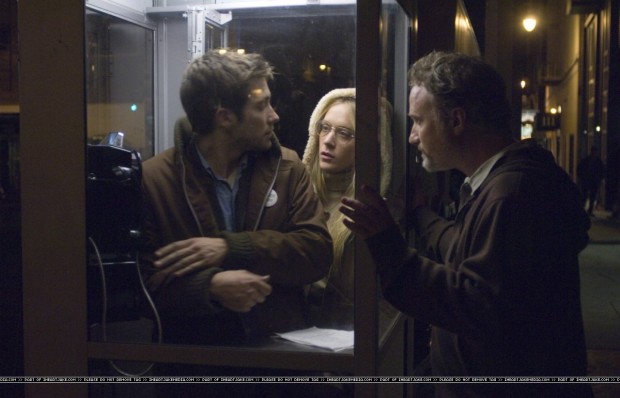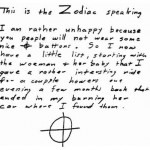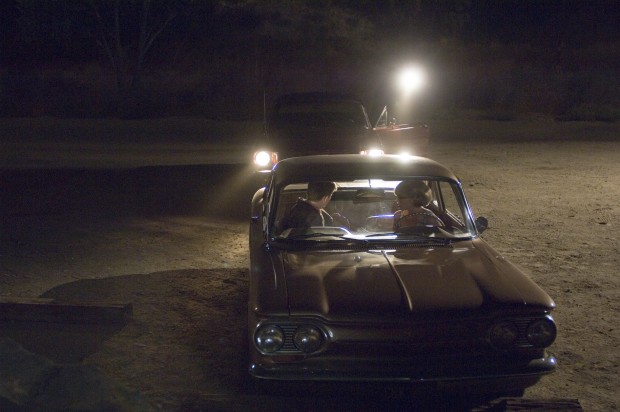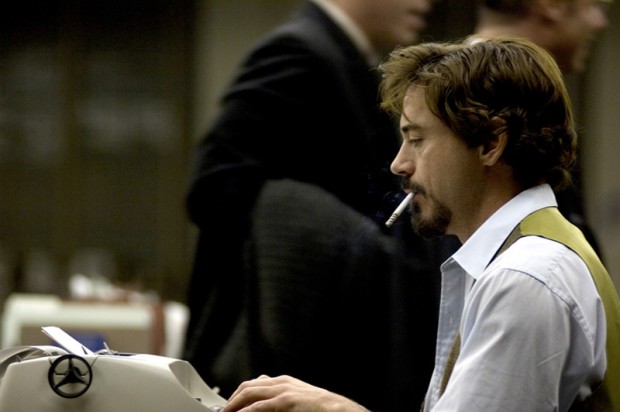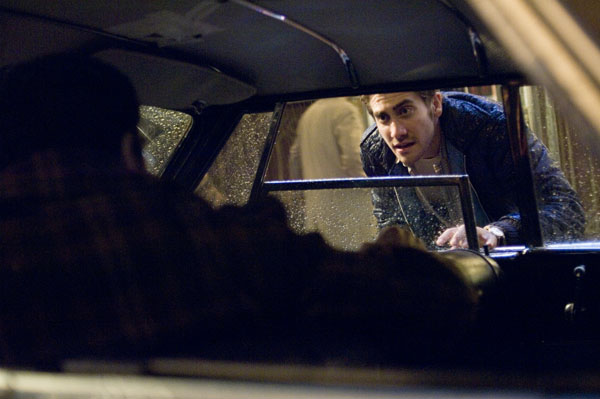Saturday, February 21, 2015
Friday, June 13, 2014
Aaaaand He's Back!
After spending too much time trying to launch a WordPress blog that I then forgot about, I'm returning to my hallowed ground on Blogger.
Did you miss me, Digital Void?
I missed you.
And I came up with an idea to actually make the title of this blog relevant. The first entry will be forthcoming.
Love, Anthony
Did you miss me, Digital Void?
I missed you.
And I came up with an idea to actually make the title of this blog relevant. The first entry will be forthcoming.
Love, Anthony
Friday, October 18, 2013
Good Morning, Interwebs
It's been a long, long time since I posted here. And somehow, probably due to the enduring popularity of Superman, I still get pageviews. NOTE: Expect an update on that 2-year old Superman post, for all you legions of admirers following the progress... of all this.
Well, after an abortive attempt to move to Wordpress (which is kind of annoying unless you have a paid skin like ScreenRant.com, a site I've been writing for since May, as a totally unconnected aside - read my articles here), I realized that this platform is a better fit for me. It's easier to use, it's kind of more fun, and I miss it.
It's nice (and fun) to be able to write about movie news, but I miss writing reviews. So expect more of those in the days and weeks to come.
As for updates: I moved to San Francisco with my lovely girlfriend +Megan Fischbein, in a pretty great place in Laurel Heights (for a bargain), and I can't remember ever being this happy. I'm almost 35, and in a good place in my life. I was bitten by a mosquito on my left eyelid and now my eye is swollen. Everyone at work asked if I was in a barfight, so I just say yes.
It's good to be back.
Well, after an abortive attempt to move to Wordpress (which is kind of annoying unless you have a paid skin like ScreenRant.com, a site I've been writing for since May, as a totally unconnected aside - read my articles here), I realized that this platform is a better fit for me. It's easier to use, it's kind of more fun, and I miss it.
It's nice (and fun) to be able to write about movie news, but I miss writing reviews. So expect more of those in the days and weeks to come.
As for updates: I moved to San Francisco with my lovely girlfriend +Megan Fischbein, in a pretty great place in Laurel Heights (for a bargain), and I can't remember ever being this happy. I'm almost 35, and in a good place in my life. I was bitten by a mosquito on my left eyelid and now my eye is swollen. Everyone at work asked if I was in a barfight, so I just say yes.
It's good to be back.
Wednesday, March 7, 2012
Underrated: IN TIME - Fritter And Waste The Hours In An Offhand Way...
As Rolling Stone's venerable senior film critic Peter Travers once pointed out: critics can be asses. Gattaca and Lord of War writer-director Andrew Niccol's In Time was in and out of theaters so fast that I had no chance to catch it until recently. What the hell is wrong with people? (That's a rhetorical question, and the easy answer is: "Dude, so, so much!") The film has a 37% rating on RottenTomatoes.com, ("rotten") and only a slightly-better rating on Metacritic: 53 (the "yellow-zone"). So to reiterate: critics can be - and mostly are - asses. Even when viewed within the narrow margins of the "genre film," In Time is clever, fun and impeccably shot.
So here's my freakin' two cents: it's an entertaining, slightly-silly futuristic take on Bonnie & Clyde. How did the reviewers miss this? Even Roger Ebert's essentially positive take on the film missed the clear parallels to Arthur Penn's great 60's crime flick. Maybe the wonky sci-fi elements - sleek and elegant in Niccol's great Gattaca, somewhat clunky and incongruous here - threw people off. The opening monologue sets up the world: people are genetically engineered to stop aging at age 25, but they died a year later. They can borrow, bargain, steal or work for more time, but their ticking clock is ever-present, in the form of big green numbers counting down on their forearm.
 Will Salas (Justin Timberlake, in another strong - if less demanding - performance after his impressive turn in The Social Network), is "25 plus 3," and lives with his 50-year old mother (Olivia Wilde, still young-looking and sexy) while working a dead-end factory job in a Los Angeles ghetto. The time period is vague - it's one of the main (and valid) complaints in most reviews: is this really the future? Everything seems fairly contemporary, from the clothing and furniture to the slightly-altered muscle car the Bad Guy drives. I actually think the film is set in a parallel universe... the opening narration does not explain how or why humans have this in-grown ticking clock, and Niccol wisely never tries.
Will Salas (Justin Timberlake, in another strong - if less demanding - performance after his impressive turn in The Social Network), is "25 plus 3," and lives with his 50-year old mother (Olivia Wilde, still young-looking and sexy) while working a dead-end factory job in a Los Angeles ghetto. The time period is vague - it's one of the main (and valid) complaints in most reviews: is this really the future? Everything seems fairly contemporary, from the clothing and furniture to the slightly-altered muscle car the Bad Guy drives. I actually think the film is set in a parallel universe... the opening narration does not explain how or why humans have this in-grown ticking clock, and Niccol wisely never tries.While drinking with possibly his only friend Borel (The Big Bang Theory's Johnny Galecki, playing a slovenly scumbag like only he can), Will meets Henry Hamilton (Matt Bomer), a rich guy slumming it in the ghetto. Will saves him from almost certain death at the hands of a couple of prostitutes and then from the street-trawling Minute Men, dapper gangsters who corner timid slum-dwellers and drain all the time they can. Henry has been 25 for far too long, and wants nothing more than an end. As Will sleeps, Henry transfers his remaining years - over a century - to Will. The transfer process seems to consist of grabbing the others wrists, turning them slightly, and time transfers over. How, exactly? The process doesn't seem physiologically possible, but if you're willing to swallow the premise, this should go down easy.
There is something about film which puts people off - maybe the tone, which is in line with Niccol's usual somewhat antiseptic style. The whole film is somewhat distant and chilly, and even the marvelous cinematography by Roger Deakins gives off a chill, unusual for this great, Oscar-winning DP. Niccol and Deakins make fascinating use of the Los Angeles locations, which exude a distinctly-SoCal aura of urban decay.
I can see how plenty of audience members could be confused - the whole thing suddenly shifts halfway through. Will spends years of Henry's gift of time just getting through the different "Time Zones" which separate the classes. This layout and system is never explained - nor are we given any overall sense of organization or government of this apparently parallel reality. Not that we really need it, but some kind of overview would have helped to orient the audience. By the time Will meets Sylvia Reis (Big Love's Amanda Seyfried), the lovely and beguiling daughter of mega-rich Phillipe Reis (Mad Men's suave little SOB Vincent Kartheiser, effortlessly owning his scenes and proving that he'll be a welcome presence in features). Phillipe has been 25 for over eight decades and may (or may not) possess a legendary amount of years... and his name seems to be on every building in Will's ghetto.
The first half of the film sets up the rules of this world (albeit a little too vaguely, as I've mentioned), and the second half takes off in a new direction, with Will and Sylvia on the run and Cillian Murphy's cold-eyed Timekeeper on their heels. The eternal-youth and time-as-currency themes are all-too-relevant in this era of faster-faster-now-now-hurry-hurry... this is a time where we get agitated if our internet browser takes too long to load our porn - I mean, our local news website. I wonder if Niccol has a director's cut hidden up his sleeve which fleshes out the overall world a little more. Even if we don't see that film, the one we have is worth checking - it's fun, clever and thought-provoking.
Monday, December 5, 2011
Taped Shut
Sometimes, I wish
my mouth was taped
shut,
that way
I wouldn't be so
horrifically wrong
all the
time.
my mouth was taped
shut,
that way
I wouldn't be so
horrifically wrong
all the
time.
Wednesday, November 30, 2011
Mr. Faded Glory - Pearl Jam: Twenty
I'm nostalgic about the 1990's. It's not that I miss high school. At fucking all. As a graduate of the Rio Vista High School Class of '97, I can say with absolute certainty that those four endless, hellish years I spent in that house of horrors the city fathers for some reason called an institute of learning were definitely some of the worst of my life... and I once lived in a shed in the middle of the Washington state woods with an insane hippie chick.
I'm sentimental about the music, I guess, but I didn't know that until I watched Cameron Crowe's wonderful documentary Pearl Jam: Twenty. Crowe was given extraordinary access to a band that has outlived the "grunge" pop-culture craze which practically haunted every band to come out of Seattle in the wake of Nirvana, and indeed is the last of those bands still touring and recording with their original line-up (minus Pearl Jam's bizarre list of former drummers, recounting in a very funny, This Is Spinal Tap-sampling montage) - Soundgarden, Alice in Chains, Mother Love Bone, Hole... all gone. The film is a little too exhaustive in closely chronicling the band's timeline, and it comes at the expense of incisive insight into the band's in-fighting and personality clashes. Still, to see this great American rock band's life captured like this, and by Cameron Crowe (whose second feature film, Singles, featured members of Pearl Jam and Soundgarden in cameo roles), is an amazing experience.
I can't imagine anyone under the age of 25 or so really appreciating this film or even understanding it. Pearl Jam, Soundgarden, Nirvana, Alice in Chains, Smashing Pumpkins, Red Hot Chili Peppers... these bands were the soundtrack to my wretched high school years. Did I mention how much I hated high school? (I did? Really? Shall I beat that shit right into the ground? I was unpopular, insecure and had few friends. I'm grateful for all that, looking back... I know too many people whose high school years turned out to the best years of their life. I like to think that mine are still ahead of me.) Pearl Jam: Twenty is clearly for Pearl Jam fans, but it reflects the shifting realities of an entire generation.
I turned 33 years old on November 22, 2011. Typing that sentence was not quite as painful as I thought it would be, but it's still a reality I'd like to somehow negate. As George Clooney's character said to Sam Rockwell's Chuck Barris in Confessions of a Dangerous Mind; "You're 32 years old, and you've achieved nothing. Jesus Christ was dead and alive again by 33. You better get crackin'." He could be talking about me, or damn near everyone I went to high school with. Or almost anyone my own age. Mine is a generation full of late-starters... I don't know why, but it might have something to do with Pearl Jam.
I'm kidding. Kind of. In an indirect way, it's all Eddie Vedder's fault. For a very, very short while I sang in a garage band, and one of the songs the guitar player insisted I sing was Pearl Jam's "Alive." So I did, quite a few times, but I guess I was trying too hard to sound like Eddie, I didn't really have the "self-balls" (as the guitar player told me) to be a frontman for a band at the time, so they fired me. Oh well. Early success didn't really turn out too well for Kurt Cobain, Jim Morrison, Jimi Hendrix, Amy Winehouse, Janis Joplin or Robert Johnson, did it? And life ended badly for Andrew Wood, as well.
The story of Pearl Jam exists in the shadow of the influential Seattle band Mother Love Bone. That band featured future Pearl Jam members Jeff Ament and Stone Gossard, and its lead singer was a fireball named Andrew Wood. Amazing archive footage reveals Wood as a charismatic, glam-influenced frontman, relentlessly "on." Wood's tragic death at age 24 from a heroin overdose still affects the surviving members of Mother Love Bone. Stone Gossard thought his career was over, but he approached Mike McCready, a Seattle lead guitarist, who insisted that Stone hook up again with Jeff Ament. The founding lineup is complete when they hear a demo recorded by a San Diego surfer and musician, who laid his vocals over one of Stone and Jeff's instrumental tracks. According to the film, the song would end up being the haunting, bluesy ballad "Footsteps." The singer, of course, was Ed Vedder.
Circling back to that abortive attempt to start a band in high school: on at least one occasion, the guitar player would put on Pearl Jam and tell me that this was how I should be singing. The problem: despite the countless soundalike ciphers that would follow, only Vedder really sings like Vedder, which is how it should be. We were handicapped by ludicrously high expectations, and I was hamstrung by my crippling shyness and insecurity. I'm somewhat happy to report most of that shit has been sloughed away - mostly by life itself, partly by film school... you can't be a withdrawn loner and expect to get any movies made. Well, you can, but they'll be really shitty movies.
Watching Pearl Jam: Twenty made me wish I'd been far more hungry and confident in high school - but that's probably the most common regret in America. (Aside from the Democrats nominating John Kerry in 2004 - we really should've stuck with Howard Dean.) I've come a long way from the core group of "alternative" rock bands I used to endlessly listen to from 1992 - 97; I discovered Tom Waits, delved deep into the Grateful Dead, Bob Dylan, Neil Young and jazz greats like Miles Davis, John Coltrane and Thelonius Monk. I was gripped by a bizarre urge to the get to the bottom of the Great American Blues Myth, and studied up on Robert Johnson, Muddy Waters, Howlin' Wolf, and all the monstrously brilliant men and women who shared the stage with these people (including Charley Patton, who happens to be the proto-Jimi Hendrix. Playing the guitar with your teeth? Upside down? Around your back? Charley did it all first.) Lately I've been listening to the new Black Keys single "Lonely Boy" and the Trent Reznor/Karen O/Atticus Rose cover of "Immigrant Song" over and over again, but this movie has reignited my love of Pearl Jam, and my appreciation of the music of the 90's.
My favorite scene: at the band's tenth anniversary concert in Las Vegas, Eddie Vedder sang the great Mother Love Bone song "Crown of Thorns." The story of Mr. Faded Glory, a somewhat death-obsessed worldview, and a love that leaves me alone. Vedder acknowledged the past with that performance, and the song has remained in their concert set list ever since. You can disagree with their politics - and indeed, they're not exactly known for their crowd-pleasing sense of humor (take the much-booed rendition of Vedder's protest song, "Bu$hleaguer," featuring a George W. Bush mask impaled on a microphone stand as Vedder intones the not-that-clever lyrics while pouring alcohol in the mask's mouth.), but they scaled back their career, and have survived.
Twenty years. Holy fuck. Love it.
Tuesday, November 1, 2011
Adapt This: Zodiac
We have madmen waiting...
-Mideast terrorist leader,
1978
-opening quote of Zodiac, by Robert Graysmith
Sometimes, if you’ve seen the movie, you don’t need to read the book (The Boys From Brazil,Rosemary’s Baby, Marathon Man). Sometimes, the movie is a wretched pile of steaming garbage, making a great book seem even better in comparison (I’m looking at you, The World According to Garp and Beloved). Then you have cases like Zodiac, in which a terrific book is turned into an equally terrific movie, while being utterly different from each other.
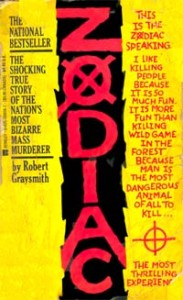 I am well aware that David Fincher’s Zodiac has its haters. And while I’m not entirely clear whether these folks take issue with the film or whether it has something do with Fincher himself, I urge them to watch it again with an open mind. Zodiac is a richly layered, endlessly fascinating probe into one of the most haunting and perverse serial killer cases in American history. And to this day, it remains unsolved. I believe Zodiac is one of Fincher’s best films, far superior to his wildly over-rated The Social Network. Despite Fincher’s usual distant, coldly methodical tone, I also believe this is his most personal film, for a variety of reasons.
I am well aware that David Fincher’s Zodiac has its haters. And while I’m not entirely clear whether these folks take issue with the film or whether it has something do with Fincher himself, I urge them to watch it again with an open mind. Zodiac is a richly layered, endlessly fascinating probe into one of the most haunting and perverse serial killer cases in American history. And to this day, it remains unsolved. I believe Zodiac is one of Fincher’s best films, far superior to his wildly over-rated The Social Network. Despite Fincher’s usual distant, coldly methodical tone, I also believe this is his most personal film, for a variety of reasons.
First, the basics: between December 20, 1968 and October 11, 1969, a deranged nutjob sent taunting letters to several newspapers in the California Bay Area which claimed responsibility for a series of brutal murders. The man who named himself the Zodiac sent four complicated cryptograms with his letters, only one of which has been persuasively decoded. Six victims have been confirmed to have been the work of the Zodiac Killer, and there are several more suspected, suggesting that Zodiac might have been active as early as 1966 and as late as 1971. The case remains open in Solano County, Napa County, and the city of Vallejo, California. While the case was labeled as “inactive” by the San Francisco Police Department, it was reopened sometime between 2004 and 2007.
Robert Graysmith was working as a political cartoonist at the San Francisco Chronicle at the time and was right in the thick of things. After spending years collecting a private scrapbook covering the killings, he published his famous nonfiction book in 1986.
Enter screenwriter James Vanderbilt (Darkness Falls, Basic, the upcoming The Amazing Spider-Man). After reading the book in high school and then meeting Graysmith (and according to some accounts, personally optioned the book at the age of eighteen - as a member of the storied Vanderbilt clan, this was possible.), Vanderbilt pitched the idea to Phoenix Pictures’ Mike Medavoy and Brad Fischer, who agreed to let him have more creative control over the project. The script attracted David Fincher, who grew up in Marin County. As Fincher told the New York Times:
"I remember coming home and saying the highway patrol had been following our school buses for a couple weeks now. And my dad, who worked from home, and who was very dry, not one to soft-pedal things, turned slowly in his chair and said: ‘Oh yeah. There’s a serial killer who has killed four or five people, who calls himself Zodiac, who’s threatened to take a high-powered rifle and shoot out the tires of a school bus, and then shoot the children as they come off the bus.’"
What fuels such an obsessive, morbid fascination with these kinds of things? Are we a culture of potential sociopaths, a culture of unfeeling savages so empty and devoid of human empathy that we study instances of sheer horrific tragedy just to give our own private prick-ish tendencies some kind of perspective? Kind of, yeah. But you're not here for my armchair sociological insights. Like Jack the Ripper, the Zodiac Killer is one of unknown boogeymen that still have the power to haunt our collective psyche. It's enough to inspire a former cartoonist's decades-long investigation - not to mention getting the preternatural attention of David Fincher.
So how is the movie different from the book? If you're tempted to wonder if the book is "better," know that such qualifications are pointless here. I'm sure much the same can be said of the upcoming Moneyball, an intriguing-looking movie based on - by many accounts - a relatively dry, statistics-drenched work of nonfiction. Robert Graysmith's Zodiac gives us the facts in a straight-forward, exhaustively researched, detailed narrative. The prose is thoroughly readable, and as one reads on, becoming utterly absorbed in what happened all those years ago, there is the sense that Graysmith meant his book as a tribute to the victims, the majority of them young couples ambushed on a date, next to a lake, in a parking lot. I think that Graysmith, subconsciously or not, considered himself a recording angel. These people existed. They were brutally killed. The killer wrote letters to the police, mocking them with cyphers and riddles. He was never caught or even concretely identified. How fucked up is that? Who would do these things and why?
The movie is a gripping dramatization of these events. Fincher has been lauded by critics for being able to craft a film so full of names, dates, events and mysteries and never once is the viewer lost or wondering what just happened. But what was this director's driving need to tell this story borne of? He's from the Bay Area, and on some primal level, these killings still haunt the area. I feel an odd connection to this story as well: Zodiac's first confirmed victims, David Arthur Faraday and Betty Lou Jensen, were killed in Benicia, California; Michael Mageau Renault and Darlene Elizabeth Ferrin were attacked in Vallejo, California; both towns are part of Solano County, as is my own hometown of Rio Vista. I know Benicia, I know Vallejo, I know San Francisco - this part of the world is famous for its tolerance and accepting attitude. The knowledge that this place can also breed such vicious, unfathomable violence is deeply disturbing... and endlessly fascinating.
David Fincher had already directed a serial killer movie, the modern classic Se7en, which propelled Brad Pitt's star deep into orbit, put Kevin Spacey on the map in a big way, and made it common practice to put numbers in movie titles for no reason. That movie was a hard-line thriller, heavy on style and atmosphere and grisly hideousness. Zodiac recreates the killings in clear-eyed detail, but it's not about the gore (and aside from a graphic stabbing scene and a slow-motion gunshot to the head, it's a surprisingly bloodless film), it's about the three men who made the Zodiac killings a personal mission.
Robert Graysmith (Jake Gyllenhaal as his most wide-eyed, earnest and convincing) was a divorced cartoonist. Dave Toschi (a strong Mark Ruffalo)was a flamboyant, well-known San Francisco supercop, the basis for not one but two iconic movie mega-detectives: Bullitt and Dirty Harry. Paul Avery (Robert Downey Jr., typecast but excellent) was a boozing, driven crime reporter who suffered a personal melt-down in the wake of the Zodiac killings but went on to publish probing accounts of the Patty Hearst kidnapping by the Symbionese Liberation Army and later a book on the subject. The unique structure of this film places each of these characters in the role of central protagonist at different times. And we cannot overlook the solid supporting performance by Anthony Edwards as Bill Armstrong, Toschi's partner and the cop whose notes and reports supplied some of the most detailed accounts of this case.
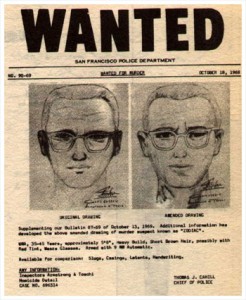 As time passes, the case grows cold and the public consciousness moves on. Avery melts down and disappears. Toschi fights crime, one day at a time. Graysmith gets the bright idea to write a book about the case, thinking that something new might shake loose. Graysmith gets Zodiac's - or someone's - attention, culminating in one tense, wordless encounter in a hardware story between Graysmith and everyone's favorite suspect, one Arthur Leigh Allen.
As time passes, the case grows cold and the public consciousness moves on. Avery melts down and disappears. Toschi fights crime, one day at a time. Graysmith gets the bright idea to write a book about the case, thinking that something new might shake loose. Graysmith gets Zodiac's - or someone's - attention, culminating in one tense, wordless encounter in a hardware story between Graysmith and everyone's favorite suspect, one Arthur Leigh Allen.
This all occurs under Fincher's steely, demanding direction. Vanderbilt's incisive script handles the meta-story in an admirably restrained way. The book studiously ignores the personal lives of these three men. Avery's meltdown is never mentioned, Toschi's obsession is hinted at, and as for Graysmith... well, he wrote the book, after all, devoting years to a maddeningly unresolved series of crimes. Fincher, Vanderbilt and the producers did further research, wisely realizing that to hold an audience's attention they'd need more than a series of grisly murders and that huge central question: who did this?
Jake Gyllenhaal turns in what is still his best performance to date, infusing Graysmith the Eagle Scout with a deeply honest urge to solve this puzzle. Graysmith's near-desperate confusion and befuddlement is a proxy for our own: why, after shooting at couples in parked cars, did Zodiac shoot cabbie Paul Stine in the middle of San Francisco for no apparent reason? Was Zodiac really responsible for the 1966 death of Cheri Jo Bates in Riverside? These questions whirl around the story, often leading to dead ends and red herrings. Indeed, the single most terrifying sequence in the film follows Graysmith as he is lured into a very creepy man's basement (played by the very creepy comedian Charles Fleischer - the voice of Roger Rabbit, of all things) by the promise of previously undisclosed evidence of Zodiac's identity. Fincher pours on the intense, stylized lighting, setting the encounter on an appropriately dark and rainy night. It's genuinely chilling, and ultimately fruitless.
As is the investigation. Arthur Leigh Allen was - and remains - the best suspect. A convicted sex offender, Allen was ambidextrous, which means he could have written the Zodiac letters with his non-dominant hand while in a disturbed state of mind. He had admittedly talked about shooting little kids as they came bouncing off the schoolbus - one of Zodiac's early threats. He lived right across the street from the first victim. He was one weird bastard. Was it really him? Was it one of the other suspects outlined in the book? How can we be sure either way?
Fincher may not have been driven by Graysmith's need to solve this, to honor the victims and not let this tragedy dissolve into the background. Fincher is not the most beloved director in La-La Land, and I would guess that this film is less about honoring the memories of the dead and more about the nature of obsession. Fincher is known to take a Kubrickian amount of takes per shot. Ruffalo recalled that the director required fifteen takes of him shuffling through a bunch of files. This exacting nature fits the material perfectly. Keeping Vanderbilt's studio-aggravating open-ending must have proved gratifying to a man who, upon receiving the green-light call on Fight Club, hung up the phone, turned to his assistant and said, "Those idiots just green-lit a $70 million experimental film."
There is a coda of sorts: one of Zodiac's few survivors, Michael Mageau, picks Arthur Leigh Allen's picture out of series of photos, identifying him as the man who shot him. This is a logical place to end things, but it's remarkably unsatisfying. In Graysmith's book, once the facts as he knows them are set forth, the incomplete and unresolved story laid out, he goes on and on in an extended appendix describing Zodiac's cars, his speech patterns, his weapons, his possible training. The book ends with this description from Zodiac's psychological profile:
The sexual sadist kills to achieve sexual pleasure. May never have had sexual intercourse. He seeks dehumanization of his victims into objects that he can have control over, power over. He takes great pains in appearing normal and in evading capture.
Whoever Zodiac was, he left a legacy of eternal shadow. I urge those who did not care for the film to try it again, and to read the book. You might learn more about yourself than you might expect, depending on how you react to what you find in there.
Subscribe to:
Posts (Atom)








